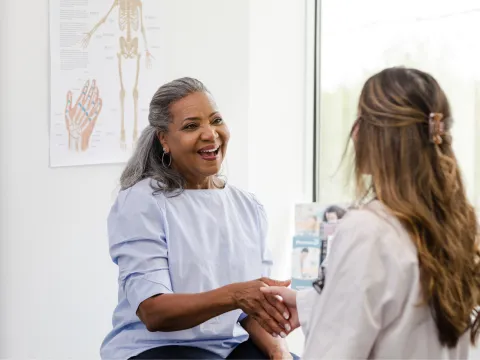- AdventHealth

Choose the health content that’s right for you, and get it delivered right in your inbox.
If you’ve been told that you have dense breasts or you have breast implants, you might be wondering what that means for your breast health and how they affect your mammograms.
We’re here with our breast surgery specialist, Thushy Siva, MD, with all you need to know about dense breasts, breast implants and mammograms.
Dense Breasts
Women’s breasts are composed of many different tissues, including fat, connective tissues, glands and others. According to Dr. Siva, “Dense breasts occur when a woman has a high ratio of connective tissues and glands compared to fat in her breasts. If a woman has a high ratio of fat compared to everything else, the breasts are considered ‘fatty.’”
Although sometimes associated with age, breast density is more commonly tied to genetics.
There is some concern that dense breasts may be an increased risk factor for breast cancer, but the challenge is obtaining clear mammography images for early diagnosis.
“Think of it this way,” says Dr. Siva. “If you’re looking through a clear piece of glass, it’s easy to see what’s on the other side. This is similar to having a fatty breast. However, if you look through a frosted piece of glass, it’s hard to tell what lies behind it. This is what happens with dense breasts.”
Some states even have laws that require imaging centers to notify women if they have dense breasts in their mammogram results letters. Once this notification is received, women with dense breasts can choose to explore additional screenings. If you have dense breasts, this can help ease your mind by adding another layer of breast cancer surveillance.
Breast Implants and Mammograms
Implants can make imaging all the breast tissue through a mammogram more challenging. Age and placement of the implant can cause some of the breast tissue to be obscured in the mammogram images.
Dr. Siva explains, “Whether or not you have implants, the mammogram is still the safest and most recommended breast cancer screening measure. But women with implants should have eight mammogram images taken for the clearest idea of what's going on.”
The mammogram technologist will take four images (two of each breast) as a standard mammogram, and then four additional pictures while gently manipulating the implant to image the breast tissue around it.
Support at Every Step
No matter what turns your breast health journey takes, AdventHealth is your beacon for support and expert breast health care.
We want to make it easier for you to get your annual mammogram. If you’re age 40 and over, have not had any breast symptoms and haven’t had a mammogram in the past year, you don’t need a physician’s order to get a screening mammogram.
Take charge of your health and schedule your mammogram today.



